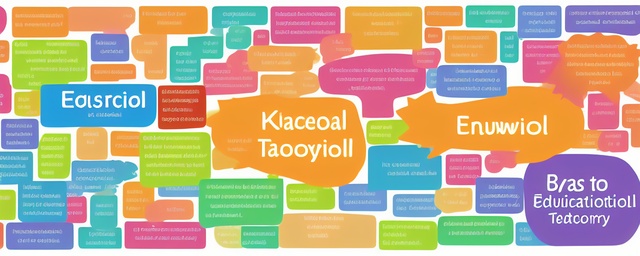
教育理论基础知识
原|2024-05-01 19:41:00|浏览:30
Education theory is a field of study that explores the principles and practices of teaching and learning. It encompasses various theories, models, and frameworks that guide educators in understanding how students learn and how to effectively facilitate their learning experiences. Some key foundational knowledge in education theory includes:
1. Behaviorism: This theory suggests that learning is a result of external stimuli and responses. Behaviorists believe that behaviors can be conditioned through reinforcement and punishment.
2. Constructivism: Constructivist theory posits that learners actively construct their own understanding and knowledge through experiences and interactions with the environment. It emphasizes hands-on learning and problem-solving.
3. Cognitive Load Theory: This theory focuses on how the working memory processes information and how cognitive load affects learning. It suggests strategies for optimizing learning by managing the amount of information presented to learners.
4. Multiple Intelligences: Proposed by Howard Gardner, this theory suggests that individuals have different types of intelligences, such as linguistic, logical-mathematical, spatial, musical, bodily-kinesthetic, interpersonal, intrapersonal, and naturalistic.
5. Sociocultural Theory: Developed by Lev Vygotsky, this theory emphasizes the role of social interactions, cultural context, and language in shaping learning and development. It highlights the importance of collaboration and scaffolding in the learning process.
6. Experiential Learning: This theory, popularized by David Kolb, suggests that learning is most effective when it occurs through concrete experiences, reflective observation, abstract conceptualization, and active experimentation.
These are just a few examples of the foundational knowledge in education theory that educators often draw upon to inform their teaching practices and instructional strategies.
猜你喜欢
- 茶的分类及代表品种
- 六大茶类的代表名茶分别有
- 茶的类型和代表
- 六大茶叶的分类及产地
- 庙的分类及代表
- 藻的分类及其代表
- 茶的分类及代表茶品特点
- 茶的分类及代表茶
- 简述茶类的分类及其代表性名茶
- 六大茶类的分类及代表茶
- 动物分类及代表
- 糖的分类及代表
- 茶的分类及代表茶叶
- 茶的分类及代表图
- 茶的分类及代表作
- 茶器按质地的分类及代表茶器
- 茶的分类及代表名茶教学设计
- 简述茶的分类及代表性名茶
- 请写出乌龙茶的分类及代表茶
- 法国雅文邑白兰地系列
- 雅文邑白兰地介绍
- 1952年法国雅文邑白兰地
- 法国雅玛邑白兰地
- 纽波利顿獒
- 法国犬品种
- 南非獒犬的优缺点
- 波尔多獒犬寿命
- 波兰狩猎犬
- 波尔多犬和罗威纳犬对比
- 波尔多犬和杜高对比
- 世界十大凶犬
- 护卫犬排行榜前十名
- 大红袍怎么泡效果好
- 大红袍怎么泡不开
- 大红袍怎么泡茶
- 大红袍怎么泡出来没颜色
- 大红袍怎么泡不苦
- 大红袍怎么泡多久
- 大红袍怎么泡才正确的特点
- 大红袍怎么泡没有柴味儿
- 大红袍怎么泡放多少合适
- 花香大红袍怎么泡
- 大红袍怎么泡茶好
- 大红袍是怎么泡的
- 大红袍怎么泡水好喝
- 大红袍用玻璃杯怎么泡
- 大红袍怎么泡味道浓一些
- 十大排名果花茶
- 十大花茶组合排名
- 十大花茶品种大全
- 十大花茶功效
- 十大花茶销量排行榜
- 十大花茶有哪些
- 十大花茶品种
- 十大花茶推荐
- 十大花卉排行榜
- 十大花卉
- 十大花茶调理内分泌
- 九五至尊秦昊明月关山
- 红茶冲泡工艺
为你推荐






































































